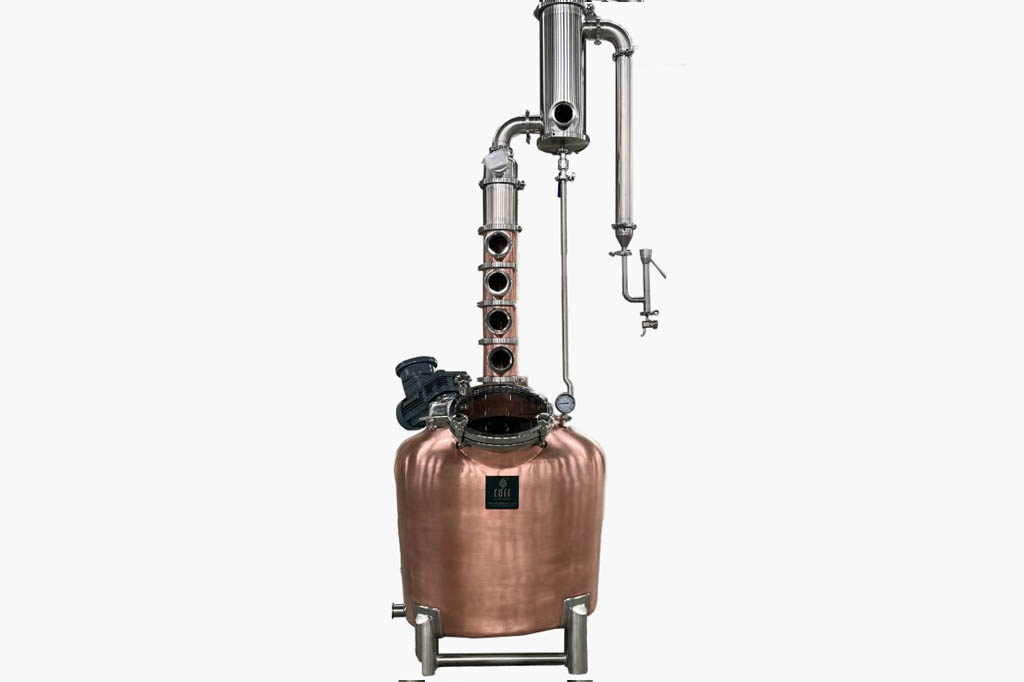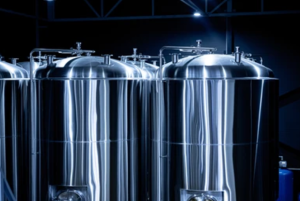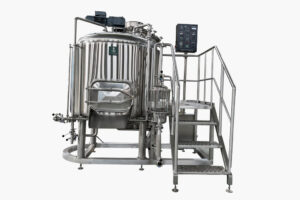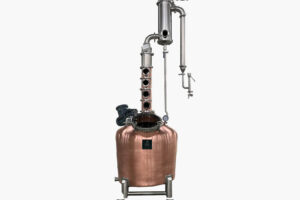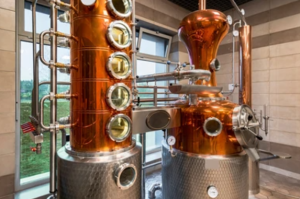COPYRIGHT © 2022 NingBo COFF Machinery Co., ltd. ALL RIGHTS RESERVED
Menu
Categories
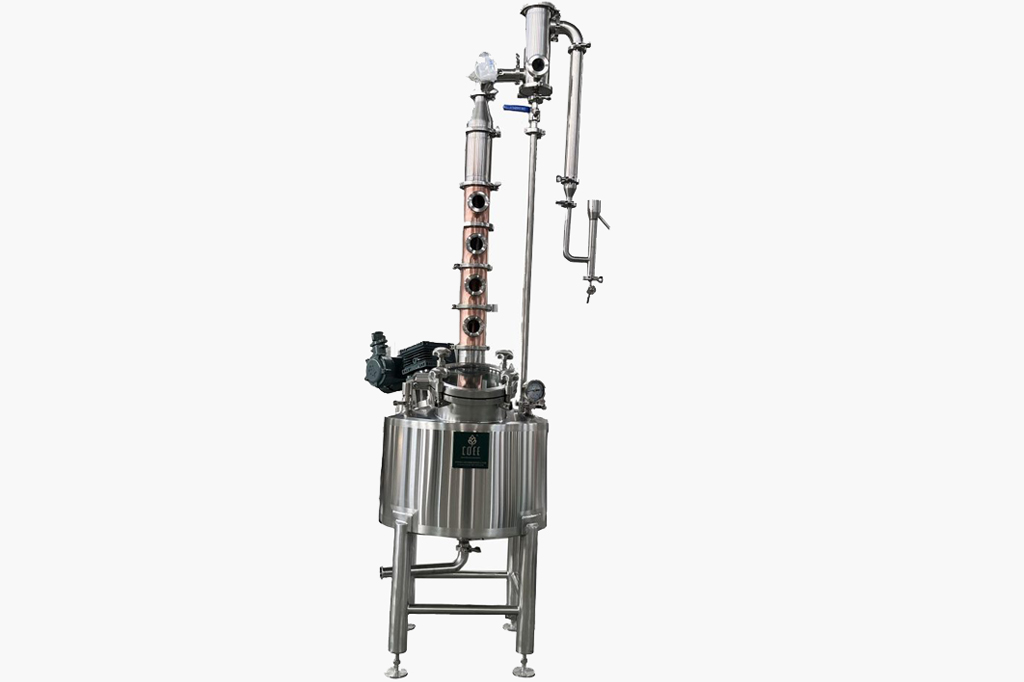
Home distilling requires specific tools to ensure a smooth and efficient process. Stainless steel distillation equipment includes stills for separating alcohol, fermenters for converting sugars into alcohol, and thermometers for precise temperature control. These tools form the backbone of any home distillery setup. However, safety must remain your top priority. Always adhere to local laws, as distilling alcohol without proper licensing is illegal in many regions, including the United States. Responsible preparation and compliance with regulations not only protect you but also enhance the quality of your craft.
Key Takeaways
- Invest in essential equipment like stills, fermenters, and thermometers to ensure a successful home distilling process.
- Prioritize safety by understanding local laws and following proper safety precautions during distillation.
- Choose the right type of still based on your goals: pot stills for flavor-rich spirits and reflux stills for high-purity alcohol.
- Maintain your equipment regularly to enhance the quality of your spirits and extend the lifespan of your tools.
- Monitor the distillation process closely using accurate measuring tools to ensure consistent results and safety.
- Discard the foreshots during distillation to eliminate harmful compounds and ensure the safety of your final product.
- Consider high-quality equipment from reputable manufacturers like COFF Machinery for improved efficiency, durability, and safety.
Understanding Alcohol Distiller Equipment
The Role of Stills in Distilling
Stills serve as the centerpiece of any home distillation setup. They separate alcohol from the fermented mixture through a process called distillation. A home copper distiller is a popular choice for beginners and experienced distillers alike. Its versatility allows you to produce ethanol, alcohol, water, and even essential oils. Copper also enhances the flavor of your spirits by removing sulfur compounds during the distillation process. This makes it an excellent option for crafting high-quality homemade beverages.
When selecting a still, consider its size and material. Smaller stills are ideal for beginners, while larger ones suit those producing in higher volumes. Stainless steel stills offer durability, but copper stills remain unmatched for their ability to improve flavor. Always ensure your still is easy to clean and maintain, as this directly impacts the quality of your final product.
Fermentation Tools and Their Importance
Fermentation tools play a critical role in converting sugars into alcohol. Fermentation tanks are essential for this process. These tanks come in various materials, including plastic, glass, and stainless steel. Plastic fermenters are lightweight and affordable, making them a good choice for beginners. Glass carboys allow you to monitor the fermentation visually, while stainless steel tanks provide durability and temperature control for advanced users.
Temperature regulation is vital during fermentation. Using cooling and heating systems, such as thermostats, ensures the yeast remains active and produces consistent results. Maintaining the right temperature prevents off-flavors and enhances the overall quality of your spirits. Properly sealed fermentation tanks also prevent contamination, ensuring a clean and successful fermentation process.
Monitoring and Measuring Equipment
Accurate monitoring and measuring tools are indispensable for home distilling. Specific gravity meters and spirit meters help you track the progress of fermentation and measure the alcohol content of your spirits. These tools allow you to make necessary adjustments during the process, ensuring the final product meets your expectations.
Thermometers are another crucial piece of equipment. They help you maintain precise temperature control during both fermentation and distillation. Consistent temperatures lead to better flavor and higher-quality spirits. Digital thermometers offer quick and accurate readings, making them a reliable choice for home distillers.
Investing in high-quality monitoring tools not only improves the efficiency of your setup but also enhances the safety of the distillation process. Regularly checking your equipment ensures everything operates smoothly and reduces the risk of errors.
Additional Accessories for Maintenance and Storage
Maintaining your distillation equipment and storing your spirits properly are crucial for long-term success. Investing in the right accessories ensures your setup remains efficient and your final product retains its quality. Here are some essential tools and tips to consider:
Cleaning Brushes and Solutions
Residue buildup inside your stills, fermenters, and tubing can affect the flavor of your spirits. Use specialized cleaning brushes to reach tight spaces and remove debris effectively. Pair these with food-grade cleaning solutions to sanitize your equipment thoroughly. Regular cleaning prevents contamination and extends the lifespan of your tools.Storage Containers
Proper storage containers preserve the flavor and quality of your spirits. Glass bottles or stainless steel kegs are excellent choices. Glass bottles allow you to monitor the clarity of your spirits, while stainless steel kegs provide durability and airtight seals. Avoid using plastic containers for long-term storage, as they may alter the taste of your product.Sealing Accessories
Airtight seals are essential for both fermentation and storage. Silicone gaskets and rubber stoppers help maintain a secure seal, preventing air from entering your containers. This minimizes the risk of oxidation, which can degrade the quality of your spirits over time.Labeling Tools
Keeping track of your batches is easier with proper labeling. Use waterproof labels and markers to note the date, type, and alcohol content of each batch. This helps you monitor aging and ensures you can replicate successful recipes in the future.Racking Canes and Siphons
Transferring liquids between containers without disturbing sediment is vital for clarity. Racking canes and siphons make this process smooth and efficient. These tools help you separate your spirits from unwanted particles, resulting in a cleaner final product.
“The quality of your spirits depends not only on the distillation process but also on how well you maintain and store your equipment and product.”
By incorporating these accessories into your home distillery, you can ensure consistent results and protect the integrity of your spirits. Proper maintenance and storage practices reflect your dedication to the craft and enhance your overall distilling experience.
Types of Alcohol Distiller Equipment
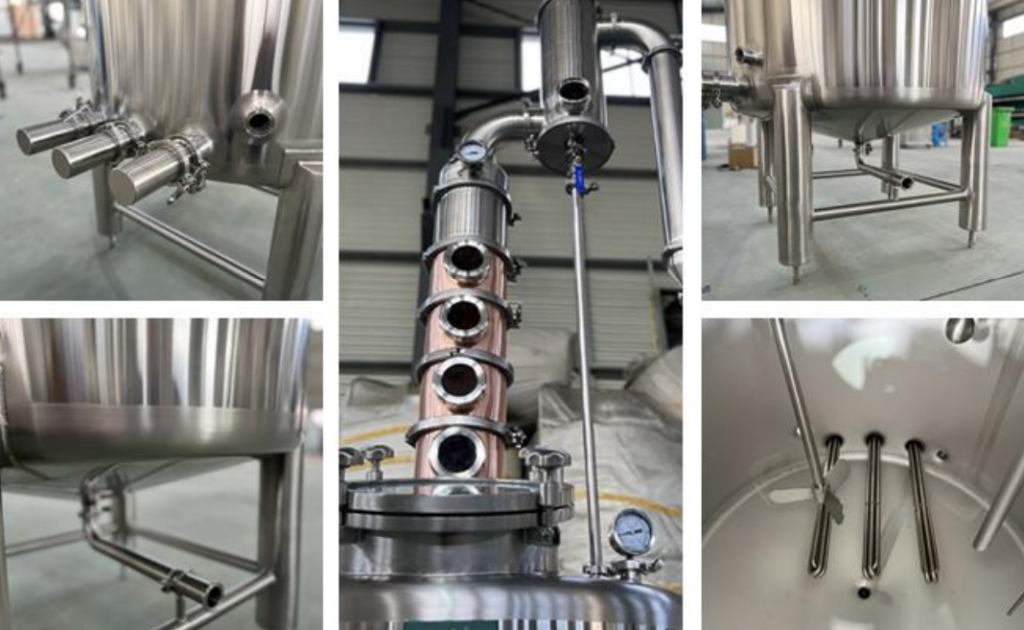
Pot Stills vs. Reflux Stills
When choosing alcohol distiller equipment, understanding the differences between pot stills and reflux stills is essential. Pot stills are simple and ideal for producing spirits like whiskey, rum, and brandy. They operate by heating the fermented liquid, separating alcohol from water and impurities through evaporation and condensation. This process retains more flavor, making pot stills perfect for crafting rich and aromatic spirits.
Reflux stills, on the other hand, focus on purity. They use additional components, such as a column filled with packing material, to refine the alcohol further. This design allows for multiple distillation cycles within a single run, producing higher-proof spirits like vodka or neutral grain alcohol. Reflux stills suit those who prioritize purity over flavor complexity.
Your choice depends on your goals. If you value flavor and character, a pot still is the way to go. If you aim for high-purity spirits, a reflux still will meet your needs.
Key Components of a Distillation Setup
A complete distillation setup includes several key components that work together to produce high-quality spirits. Each part plays a specific role in the process:
- Boiler: The boiler heats the fermented liquid, initiating the distillation process. Stainless steel boilers are durable and easy to clean, while copper boilers enhance flavor by removing sulfur compounds.
- Condenser: The condenser cools the alcohol vapor, turning it back into liquid form. Efficient condensers ensure consistent results and prevent loss of alcohol during the process.
- Thermometer: A thermometer monitors the temperature inside the still. Precise temperature control is crucial for separating alcohol from impurities effectively.
- Collection Vessel: This vessel collects the distilled alcohol. Glass containers are a popular choice because they allow you to observe the clarity of the final product.
- Column or Packing Material: Found in reflux stills, this component increases the purity of the alcohol by encouraging repeated condensation and evaporation cycles.
Investing in high-quality components ensures a smoother distillation process and better results. For example, products like the VEVOR Water Distiller demonstrate the importance of quality materials. Its food-grade 304 stainless steel construction ensures safety and durability, while its efficient design produces consistent results.
Choosing the Right Equipment for Beginners
Starting your home distilling journey requires selecting the right equipment. Beginners should focus on simplicity and ease of use. Pot stills are often the best choice for newcomers due to their straightforward design and operation. They allow you to learn the basics of distillation without overwhelming complexity.
Look for equipment that includes essential features like a built-in thermometer and a durable boiler. Compact models are ideal for small spaces and manageable batch sizes. Stainless steel options, such as those found in the VEVOR Water Distiller, offer durability and ease of maintenance, making them beginner-friendly.
Avoid overly complex setups when starting out. Focus on mastering the fundamentals before upgrading to advanced equipment. This approach ensures a positive experience and sets the foundation for future success in home distilling.
Step-by-Step Guide to Setting Up Your Home Distillery

Selecting the Ideal Location
Choosing the right location for your home distillery is crucial for safety and efficiency. You need a well-ventilated area to prevent the buildup of fumes during the distillation process. A garage, basement, or outdoor shed often works well, provided the space is free from flammable materials. Ensure the location has access to electricity and water, as these are essential for operating your equipment and cleaning up afterward.
Stability is another key factor. Place your equipment on a flat, sturdy surface to avoid accidents. Avoid cramped spaces, as you’ll need room to move around and access your tools easily. If possible, select a location with a drain nearby to simplify cleanup. Prioritize safety and practicality when making your choice.
“A safe and organized workspace sets the foundation for a successful distillation process.”
Assembling and Installing Equipment
Proper assembly and installation of your alcohol distiller equipment ensure smooth operation. Start by unpacking all components and checking for any damage. Follow the manufacturer’s instructions carefully to assemble your still, fermenter, and other tools. Tighten all connections securely to prevent leaks during the process.
Position your still near a power source if it uses an electric heating element. For gas-powered stills, ensure proper ventilation to avoid the risk of carbon monoxide buildup. Attach the condenser to the still and connect any necessary tubing for cooling water. Use food-grade hoses to maintain the purity of your spirits.
Install a thermometer on your still to monitor the temperature accurately. Place your fermenter in a stable location, away from direct sunlight, to maintain consistent fermentation conditions. Double-check all seals and gaskets to ensure airtight connections. This step minimizes the risk of contamination and enhances the quality of your final product.
Preparing for Your First Distillation Run
Before starting your first distillation run, clean all equipment thoroughly. Residue or contaminants can affect the flavor and safety of your spirits. Use food-grade cleaning solutions and brushes to sanitize your still, fermenter, and tubing. Rinse everything with clean water to remove any cleaning agents.
Prepare your mash or wash according to your chosen recipe. Pour it into the fermenter and seal it tightly. Allow the fermentation process to complete before transferring the liquid to your still. Use a specific gravity meter to confirm that fermentation is finished. This ensures the yeast has converted all sugars into alcohol.
Fill your still with the fermented liquid, leaving enough headspace to prevent boiling over. Turn on the heat source and monitor the temperature closely. Collect the distilled alcohol in a clean container, discarding the initial portion known as the “foreshots.” This step removes impurities and ensures a safer final product.
“Preparation is key to achieving high-quality results in home distilling.”
By following these steps, you can set up your home distillery effectively and safely. A well-prepared setup not only enhances the quality of your spirits but also ensures a rewarding distillation experience.
Safety and Legal Considerations for Home Distilling
Understanding Local Laws and Regulations
Before starting your home distilling journey, you must understand the legal framework in your area. In many countries, including the United States, distilling alcohol without a proper license is illegal. Federal laws strictly regulate the production of spirits, and violating these laws can result in severe penalties, including fines or imprisonment. Some states may have additional restrictions, so always check both federal and local regulations.
Obtaining the necessary permits ensures you comply with the law. Research the licensing process in your region and follow the required steps. Even if you plan to distill for personal use, legal compliance protects you from potential legal issues. Remember, ignorance of the law is not a valid defense.
“Distilling spirits without a license is illegal at the federal level. Always prioritize legal compliance to enjoy your craft responsibly.”
Safety Precautions During the Distillation Process
Safety should always be your top priority when distilling at home. The distillation process involves high temperatures, flammable materials, and pressurized equipment, all of which pose risks if not handled properly. Following safety precautions minimizes these risks and ensures a smooth experience.
Choose a Well-Ventilated Area
Always operate your distillation equipment in a space with proper ventilation. This prevents the buildup of flammable vapors, reducing the risk of fire or explosion. Avoid enclosed spaces like small rooms or closets.Monitor Temperature Closely
Use a reliable thermometer to maintain precise temperature control. Overheating can lead to dangerous pressure buildup in your still. Regular monitoring helps you avoid accidents and ensures consistent results.Inspect Equipment Before Use
Check your still, seals, and connections for any damage or leaks before each use. Faulty equipment increases the risk of accidents. Replace worn-out parts immediately to maintain safety.Keep a Fire Extinguisher Nearby
Always have a fire extinguisher within reach. Choose one rated for flammable liquids and electrical fires. Quick access to this tool can prevent minor incidents from escalating.Avoid Open Flames
If your still uses an open flame as a heat source, exercise extreme caution. Keep flammable materials away and never leave the setup unattended. Electric heating elements are safer alternatives.Discard the Foreshots
The first portion of distilled alcohol, known as the “foreshots,” contains harmful compounds like methanol. Always discard this portion to ensure the safety of your final product.
“Safety precautions are not optional. They protect you, your equipment, and the quality of your spirits.”
Avoiding Common Hazards in Home Distilling
Home distilling comes with inherent risks, but you can avoid common hazards by staying informed and prepared. Awareness of potential dangers helps you take proactive measures to prevent accidents.
Methanol Contamination
Methanol, a toxic byproduct of fermentation, can appear in small quantities during distillation. Discarding the foreshots eliminates most of this risk. Never consume spirits without proper testing to ensure safety.Pressure Buildup
Improperly sealed equipment can lead to dangerous pressure buildup. Always use a still with a pressure relief valve and monitor the system during operation. Never block vents or modify your equipment in unsafe ways.Fire and Explosion Risks
Alcohol vapors are highly flammable. Avoid smoking or using open flames near your distillation setup. Ensure your workspace is free from ignition sources and flammable materials.Contamination
Dirty equipment introduces contaminants that affect the flavor and safety of your spirits. Clean and sanitize all tools thoroughly before and after each use. Use food-grade cleaning solutions to maintain hygiene.Improper Storage
Storing spirits in unsuitable containers, such as plastic, can alter their taste and safety. Use glass bottles or stainless steel kegs with airtight seals to preserve quality.
“Understanding and addressing common hazards ensures a safer and more enjoyable distilling experience.”
By adhering to legal requirements and prioritizing safety, you can enjoy the art of home distilling responsibly. A well-informed approach not only protects you but also enhances the quality of your craft.
Tips for Successful Home Distilling
Cleaning and Maintaining Your Equipment
Proper cleaning and maintenance of your distillation equipment ensure consistent results and extend the lifespan of your tools. Residue from previous distillation runs can alter the flavor and quality of your spirits. You must clean your equipment thoroughly after each use to avoid contamination.
Disassemble Your Equipment
Take apart your still, fermenter, and other components. This allows you to clean every part effectively, especially hard-to-reach areas.Use Food-Grade Cleaning Solutions
Choose cleaning agents specifically designed for distillation equipment. These solutions remove residue without leaving harmful chemicals behind. Avoid household cleaners that may damage your tools or affect the taste of your spirits.Scrub with Cleaning Brushes
Use brushes to clean the interior of your still, tubing, and fermenter. Focus on areas where residue tends to build up, such as corners and joints. A thorough scrub prevents bacterial growth and ensures a clean surface for your next batch.Rinse with Hot Water
Rinse all components with hot water to remove any remaining cleaning solution. Hot water also helps sanitize your equipment, adding an extra layer of safety.Inspect for Wear and Tear
Check seals, gaskets, and connections for signs of wear. Replace damaged parts immediately to maintain airtight seals and prevent leaks during distillation.
“Clean equipment is the foundation of high-quality spirits. Neglecting this step compromises both safety and flavor.”
Regular maintenance not only improves the efficiency of your setup but also reflects your dedication to the craft. A well-maintained system produces better results and enhances your overall distilling experience.
Monitoring the Distillation Process Effectively
Effective monitoring during distillation ensures safety and improves the quality of your spirits. Paying close attention to key factors like temperature and alcohol content helps you achieve consistent results.
Track Temperature with a Thermometer
Use a reliable thermometer to monitor the temperature inside your still. Precise control is crucial for separating alcohol from impurities. Keep the temperature steady to avoid overheating or under-distilling.Measure Alcohol Content with a Spirit Meter
A spirit meter helps you determine the alcohol content of your distillate. This tool ensures your product meets your desired proof and allows you to make adjustments if necessary.Observe the Flow Rate
The flow rate of your distillate provides valuable information about the process. A steady, controlled flow indicates proper operation. If the flow slows or stops, check for blockages or temperature fluctuations.Discard the Foreshots
The first portion of your distillate, known as the foreshots, contains harmful compounds like methanol. Always discard this portion to ensure the safety of your final product.
“Monitoring every stage of the distillation process guarantees both safety and quality.”
By staying vigilant, you can identify and address issues before they escalate. Effective monitoring not only enhances the quality of your spirits but also ensures a safer distillation experience.
Troubleshooting Common Issues in Distilling
Even with careful preparation, you may encounter challenges during the distillation process. Knowing how to troubleshoot common issues helps you resolve problems quickly and maintain the quality of your spirits.
Low Alcohol Yield
If your yield is lower than expected, check the sugar content of your mash or wash. Insufficient sugar reduces alcohol production during fermentation. Use a hydrometer to measure specific gravity and adjust your recipe accordingly.Off-Flavors in Spirits
Contamination or improper fermentation often causes off-flavors. Clean your equipment thoroughly and ensure your fermentation temperature remains consistent. Avoid using poor-quality ingredients, as they can affect the taste.Cloudy Distillate
Cloudiness usually results from impurities or improper separation during distillation. Monitor your temperature closely and discard the foreshots. Use a clean collection vessel to avoid introducing contaminants.Pressure Buildup in the Still
Pressure buildup poses a serious safety risk. Check your seals and connections for blockages. Ensure your still has a pressure relief valve and never modify your equipment in unsafe ways.Leaking Equipment
Leaks compromise both safety and efficiency. Inspect your still for damaged seals or loose connections. Replace worn-out parts immediately to maintain airtight operation.
“Troubleshooting is an essential skill for any home distiller. Addressing issues promptly ensures a smooth and successful process.”
By understanding these common problems and their solutions, you can refine your technique and improve your results. Troubleshooting not only enhances your skills but also builds confidence in your ability to produce high-quality spirits.
Benefits of Using High-Quality Alcohol Distiller Equipment
Enhanced Efficiency and Performance
High-quality alcohol distiller equipment significantly improves the efficiency of your distillation process. Superior materials and precise engineering ensure consistent heat distribution, which allows for better control over the distillation stages. This precision minimizes energy waste and maximizes alcohol yield. For example, copper stills not only conduct heat efficiently but also remove sulfur compounds, enhancing the flavor of your spirits.
Efficient equipment also reduces the time required for each distillation run. With reliable tools, you can focus on refining your craft instead of troubleshooting issues. Historically, American farmers in the pre-Revolutionary era relied on simple yet effective distillation methods to produce whiskey from locally grown grains like wheat, rye, and corn. Their success highlights how efficient processes can lead to high-quality results. By investing in advanced equipment, you can achieve similar efficiency while producing spirits with exceptional taste and clarity.
Durability and Longevity of Equipment
Durable equipment ensures long-term reliability, saving you money and effort over time. High-quality materials like stainless steel and copper resist wear and corrosion, even with frequent use. These materials maintain their structural integrity, ensuring your equipment performs consistently for years. For instance, stainless steel fermenters withstand temperature fluctuations and are easy to clean, making them a practical choice for home distillers.
Longevity also means fewer replacements and repairs. Farmers in early America often crafted their own distillation tools, which were built to last through repeated use. Modern advancements in manufacturing have made it possible to create even more durable equipment. When you choose high-quality tools, you invest in a setup that supports your distilling journey for the long haul.
Improved Safety Features
Safety is paramount in home distilling, and high-quality equipment includes features designed to protect you during the process. Reliable seals, pressure relief valves, and precise temperature controls reduce the risk of accidents. These features ensure that your equipment operates smoothly, even under high temperatures and pressure.
For example, modern stills often include built-in thermometers and safety locks to prevent overheating or leaks. These innovations address common hazards, such as pressure buildup and flammable vapor exposure. Early American distillers, who worked with rudimentary tools, faced greater risks due to the lack of safety mechanisms. Today, you can avoid these dangers by using advanced equipment that prioritizes your well-being.
“Investing in high-quality equipment not only enhances your results but also ensures a safer and more enjoyable distilling experience.”
By choosing reliable tools, you create a secure environment for crafting spirits. This commitment to safety reflects your dedication to responsible and professional home distilling.
Why Choose COFF Machinery for Alcohol Distiller Equipment
Expertise in Craft Equipment Manufacturing
COFF Machinery stands out as a leader in the craft equipment manufacturing industry. With years of experience, COFF has perfected the art of designing and producing high-quality alcohol distiller equipment. The company’s team of skilled engineers and designers brings a wealth of knowledge to every product. Their expertise ensures that each piece of equipment meets the highest standards of performance and reliability.
COFF’s innovative approach has earned it a reputation for excellence. The company pioneered the oil-heated brewhouse, showcasing its commitment to advancing distillation technology. This innovation highlights COFF’s dedication to improving efficiency and safety for home distillers. By choosing COFF, you benefit from equipment crafted by professionals who understand the unique needs of distillers.
“COFF Machinery combines technical expertise with a deep understanding of distillation craftsmanship, ensuring superior results for every user.”
High-Quality Materials and Certifications
COFF Machinery prioritizes quality by using premium materials in its equipment. Stainless steel and copper, known for their durability and performance, form the foundation of COFF’s designs. Stainless steel resists corrosion and maintains structural integrity, while copper enhances flavor by removing sulfur compounds during distillation. This combination ensures that your equipment lasts for years and produces exceptional spirits.
The company’s commitment to quality extends to certifications. COFF’s products meet international standards, including ASME and AS1210 certifications. These certifications guarantee that the equipment adheres to strict safety and manufacturing guidelines. When you choose COFF, you invest in equipment that delivers consistent results while prioritizing your safety.
“High-quality materials and rigorous certifications make COFF Machinery a trusted choice for home distillers seeking reliable and efficient equipment.”
Customer-Centric Design and Service
COFF Machinery places customers at the center of its operations. The company’s designs reflect a deep understanding of user needs, offering features that enhance convenience and performance. For example, COFF’s equipment includes easy-to-clean components and precise temperature controls, simplifying the distillation process for beginners and experts alike.
Beyond product design, COFF excels in customer service. The company provides comprehensive support, from helping you select the right equipment to offering guidance on setup and maintenance. COFF’s dedication to customer satisfaction has earned it a loyal following worldwide. Over 80% of COFF’s customers come through recommendations, and more than 90% establish long-term partnerships with the company.
“COFF Machinery’s customer-focused approach ensures that you receive not only top-tier equipment but also the support needed to succeed in your distilling journey.”
By choosing COFF Machinery, you gain access to expertly crafted equipment, premium materials, and unparalleled customer service. These qualities make COFF a trusted partner for home distillers seeking to elevate their craft.
FAQ
1. What is the best type of still for beginners?
For beginners, a pot still is often the best choice. Its simple design makes it easy to use and understand. Pot stills are ideal for crafting spirits like whiskey, rum, and brandy, as they retain more flavor. If you’re just starting, look for a compact model with essential features like a built-in thermometer. This setup allows you to focus on learning the basics of distillation without unnecessary complexity.
2. How do I ensure the safety of my home distilling process?
Safety begins with proper preparation and equipment. Always operate your distillation setup in a well-ventilated area to prevent the buildup of flammable vapors. Inspect your equipment for leaks or damage before each use. Use a reliable thermometer to monitor temperature and avoid overheating. Keep a fire extinguisher nearby and discard the foreshots, as they contain harmful compounds like methanol. Following these precautions ensures a safer and smoother distillation experience.
3. Is it legal to distill alcohol at home?
The legality of home distilling depends on your location. In many countries, including the United States, distilling alcohol without a proper license is illegal. Federal and local laws regulate the production of spirits, and non-compliance can result in severe penalties. Research the regulations in your area and obtain the necessary permits if required. Always prioritize legal compliance to enjoy your craft responsibly.
“Distilling spirits without a license is illegal in many regions. Understanding and adhering to local laws is essential for responsible home distilling.”
4. What materials should I look for in distillation equipment?
High-quality materials like stainless steel and copper are essential for reliable and efficient distillation. Stainless steel offers durability and resistance to corrosion, making it easy to clean and maintain. Copper enhances the flavor of your spirits by removing sulfur compounds during the distillation process. When purchasing equipment, ensure it meets safety standards and certifications, such as ASME or AS1210, for added assurance.
5. How do I clean and maintain my distillation equipment?
Proper cleaning and maintenance are crucial for consistent results. Disassemble your equipment after each use and clean every component thoroughly. Use food-grade cleaning solutions to remove residue and sanitize your tools. Scrub hard-to-reach areas with specialized brushes and rinse with hot water. Regularly inspect seals, gaskets, and connections for wear and replace damaged parts immediately. Clean equipment ensures better flavor and extends the lifespan of your tools.
6. Where can I purchase high-quality home distillation equipment?
You can purchase home distillation equipment from specialized stores, online marketplaces, or professional brewing equipment suppliers. Ensure the equipment meets your needs and comes with reliable after-sales support. Companies like Micet Group and COFF Machinery offer high-quality distillation tools designed for both beginners and experienced users. Their products feature durable materials, user-friendly designs, and certifications that guarantee safety and performance.
“Choosing the right supplier ensures you receive reliable equipment and professional support for a successful distillation journey.”
7. What is the purpose of discarding the foreshots?
Foreshots are the first portion of distilled alcohol collected during the distillation process. They contain harmful compounds like methanol, which can be toxic if consumed. Discarding the foreshots ensures the safety of your final product. This step is essential for producing high-quality spirits free from impurities.
8. How can I improve the quality of my spirits?
Improving the quality of your spirits involves several factors. Use high-quality ingredients and follow a well-tested recipe. Maintain precise temperature control during fermentation and distillation. Invest in reliable monitoring tools like thermometers and spirit meters. Clean your equipment thoroughly to avoid contamination. Proper storage in glass bottles or stainless steel kegs preserves the flavor and quality of your spirits over time.
9. Can I distill different types of spirits with the same equipment?
Yes, you can distill various types of spirits using the same equipment. However, cleaning your tools thoroughly between batches is essential to prevent flavor contamination. Adjust your distillation process based on the type of spirit you’re crafting. For example, pot stills work well for whiskey and rum, while reflux stills are better suited for vodka and neutral spirits.
10. Why should I choose COFF Machinery for my distillation equipment?
COFF Machinery offers expertly crafted distillation equipment made from premium materials like stainless steel and copper. Their products meet international safety and quality standards, including ASME and AS1210 certifications. COFF’s customer-centric approach ensures you receive comprehensive support, from selecting the right tools to maintaining your setup. With a reputation for innovation and reliability, COFF Machinery is a trusted partner for home distillers seeking to elevate their craft.
“COFF Machinery combines quality, expertise, and exceptional service to provide the best distillation equipment for home distillers.”
Starting your home distilling journey requires the right tools, preparation, and a commitment to safety. Equip yourself with essential alcohol distiller equipment, follow proper setup steps, and always prioritize legal compliance. Remember, distilling alcohol without a license is illegal at the federal level, so consult local regulations before proceeding. High-quality equipment, like those offered by COFF Machinery, ensures efficiency, durability, and safety. Embrace continuous learning and experimentation to refine your craft. With dedication and responsibility, you can create exceptional spirits while enjoying the art of distillation.

